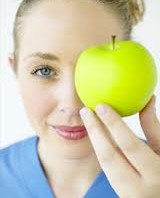 As we begin the process of improving our vision naturally, it is helpful to look closely at how we are nourishing ourselves. We need foods that are fresh, as close to the natural state as possible, and whose water content is high.
As we begin the process of improving our vision naturally, it is helpful to look closely at how we are nourishing ourselves. We need foods that are fresh, as close to the natural state as possible, and whose water content is high.
Gradually changing from the typical North-American diet consisting of white bread, pasta, meat, cakes, pastries, soft drinks and coffee, to a diet of fresh fruits and vegetables, whole grains, healthy fats, proteins, and lots of pure water, can make a huge difference to the way we feel and the way we see.
Supplement your diet with a good multi-vitamin for the minerals and vitamins you may not receive from your food. Because the soil is greatly depleted of minerals it once had, supplementation is more important than it was years ago. Sea vegetables are also an excellent source of minerals as well as incorporating antioxidants into your diet.
Research shows that antioxidants can be very helpful in keeping healthy eyes and vision. If you are diagnosed with an eye disease, research the nutritional aspects of the disease, and adjust your diet accordingly. Consult with a nutritionist or doctor who specializes in healing with nutrition and detoxification.
Remember that natural sunlight is a nutrient that we all need. Ideally, spend an hour outside in natural light each day. Take a walk in the morning or evening and enjoy the added benefit of exercise, too!
Healthy nutritional habits lay the foundation for healthy eyes and vision all your life. Enjoy those carrots and their healthy cousins from the garden and health food store!
If you feel as if you are in need supplements, it is a good idea to consult a naturopath or nutritionist to make sure that the supplements are right for you. If you have any eye disease, it is especially important that you look into nutritional support for your particular condition.
Eating for Good Nutrition Instead of for Comfort
For many of us, it is not easy to change eating habits. Most of us eat for other reasons than simply to nourish our bodies. We eat because we are bored, feel lonely, upset and in need of comfort, from habit, to fit in with the crowd … you name it!
Often the first step is increasing awareness. Each time we reach for a ‘treat,’ or look for something to eat even though we don’t feel hungry, we need to pause for a moment, and ask ourselves whether our body needs this food or whether it is serving another purpose.
Sometimes we feel a need for something to eat when we are actually dehydrated. At these times, a drink of water, juicy fruit or vegetable may take away the craving for food.
At other times what we really need is sleep, exercise, someone to talk to, or a hug. Our eating habits begin very early in childhood. When we were young and upset, many of us were soothed with a cookie, ice cream, or other sweets.
‘Treats’ were something we knew were not good for us. Yes, we were soothed, but we were also learning habits that stayed with us for a long time. Are we teaching our own children the very habits that we now have to work so hard to escape?
Remembering to choose healthy foods usually works better than depriving ourselves of the foods we love. As we feel better, we want to eat well to maintain our health.
Article Source: http://www.visioneducators.com/nutrition_for_vision.phtml
